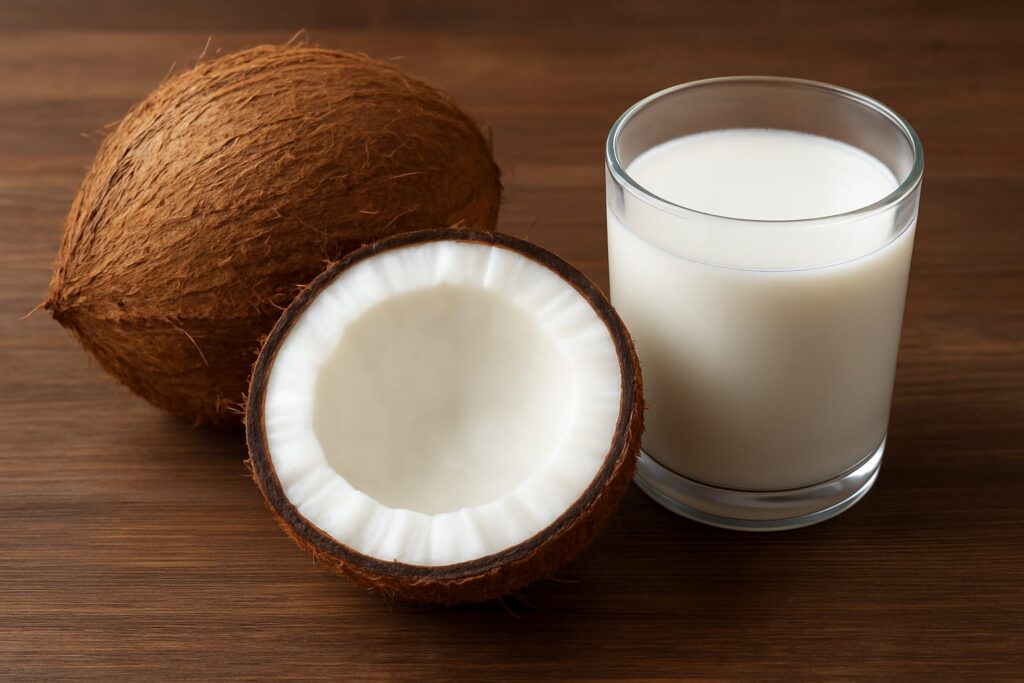Coconut Benefits and Nutritional Information
Coconuts are more than a tropical delicacy; they are nutrient-dense foods with impressive health properties. By learning about coconut benefits and nutritional information, you can better understand why this fruit is often considered a superfood and how it can support a healthy lifestyle.

Coconut Benefits and Nutritional Information Throughout History
Coconuts have earned the title “tree of life” because nearly every part of the plant has practical value. From food and drink to shelter materials, they have played a vital role in human survival and culture.
Moreover, coconuts are symbols of prosperity and purity in many traditions. Grown in more than 90 countries, they not only sustain local economies but also provide essential nutrition to millions of people worldwide.
Why Coconut Benefits and Nutritional Information Are Important
Understanding coconut benefits and nutritional information allows individuals to make informed dietary choices. Coconuts offer a natural balance of fats, proteins, carbohydrates, vitamins, and minerals. In addition, their nutrients are bioavailable, meaning the body can absorb and use them efficiently.
The nutritional value, however, differs depending on whether you consume coconut water, coconut oil, coconut milk, or raw flesh. Exploring these variations reveals just how versatile this fruit truly is.
Nutritional Composition of Coconut Meat
Coconut meat, the white, edible interior, is both delicious and nutrient-packed. A 100-gram serving typically includes:
- Calories: ~354 kcal
- Fat: 33 g (mostly medium-chain triglycerides, or MCTs)
- Protein: 3 g
- Carbohydrates: 15 g
- Fiber: 9 g
- Sugars: 6 g
In addition, coconut meat provides essential minerals like manganese, selenium, copper, and iron. These nutrients play roles in bone strength, antioxidant defense, and energy production. Furthermore, its high fiber content promotes digestive health and satiety.
Coconut Water: Benefits and Nutritional Insights
Coconut water is a refreshing beverage naturally rich in electrolytes. A 240 ml serving typically contains:
- Calories: 46 kcal
- Carbohydrates: 9 g
- Potassium: 600 mg
- Sodium: 252 mg
- Magnesium: 60 mg
Because of this balance, coconut water is excellent for rehydration. Unlike processed sports drinks, it restores electrolytes without added sugars or artificial ingredients. Therefore, it is a smart choice for athletes and anyone living in hot climates.
Coconut Oil Benefits and Nutritional Information
Coconut oil has sparked much debate among health professionals. While it is high in saturated fats, these fats are mainly MCTs, which are metabolized differently compared to long-chain fatty acids.
Some evidence suggests coconut oil may increase satiety, support metabolism, and provide quick brain energy. Moreover, lauric acid, a major component, has antimicrobial properties that may fight harmful bacteria and viruses.
Still, balance is vital. Excessive use could negatively impact cholesterol levels, so coconut oil is best consumed in moderation.
Coconut Milk and Its Nutritional Contribution
Coconut milk, created by blending grated flesh with water, is creamy and rich in nutrients. A cup (240 ml) generally contains:
- Calories: ~230 kcal
- Fat: 24 g
- Carbohydrates: 6 g
- Protein: 2 g
Coconut milk is widely used as a dairy alternative, particularly in vegan and lactose-free diets. Furthermore, it provides minerals such as iron, phosphorus, and magnesium. While calorie-dense, it can enhance the taste and nutrition of various dishes.
Health Benefits of Coconut in Daily Life
Digestive Health and Coconut Fiber
The fiber in coconut meat helps maintain bowel regularity, prevents constipation, and supports gut bacteria balance. As a result, it encourages long-term digestive health.
Coconut Benefits for Heart and Circulation
Despite its saturated fat content, coconut water and moderate amounts of coconut meat may contribute to cardiovascular well-being. Electrolytes such as potassium regulate blood pressure, while antioxidants protect arteries.
Coconut and Weight Management
Medium-chain triglycerides in coconut oil and flesh are quickly converted into energy, reducing the likelihood of fat storage. Consequently, they may support weight management by enhancing satiety.
Immune Boosting Properties of Coconuts
Lauric acid and other compounds in coconuts demonstrate antimicrobial effects. Additionally, the fruit contains antioxidants that protect cells from damage and strengthen immunity.
Hydration and Athletic Performance
Coconut water’s natural electrolyte composition makes it a superior hydration option compared to artificially sweetened beverages. Therefore, it is especially effective post-exercise or in hot conditions.
Coconut Benefits for Skin and Hair
Applied externally, coconut oil nourishes skin and hair. Consumed internally, its fatty acids promote healthy skin elasticity, hydration, and shine.
Practical Uses of Coconut Benefits and Nutritional Information
Coconuts can easily be incorporated into meals:
- Add coconut flakes to breakfast cereals or smoothies.
- Use coconut milk in soups, curries, or baked goods.
- Drink coconut water after workouts.
- Choose coconut oil for light cooking or as a butter alternative.
- Enjoy fresh coconut pieces as snacks.
Additionally, coconuts fit perfectly in gluten-free, dairy-free, and plant-based diets, making them highly versatile.
Downsides to Consider with Coconut Consumption
While the positive coconut benefits and nutritional information are compelling, there are also downsides:
- High calorie density: Coconut meat and milk are calorie-rich.
- Saturated fat: Excess intake of coconut oil may increase cholesterol.
- Allergies: Though rare, some individuals may be allergic.
Therefore, portion control and moderation remain essential when adding coconuts to your diet.
Scientific Studies on Coconut Benefits and Nutrition
Research continues to evaluate coconut’s effects on human health. Some studies indicate coconut oil can raise HDL cholesterol, while others show possible increases in LDL cholesterol as well. Similarly, coconut water is being investigated for its potential in lowering blood pressure and preventing kidney stones.
Although findings vary, scientists agree that coconuts are nutrient-dense and can play a positive role in balanced diets when consumed responsibly.
Environmental and Economic Impact of Coconut Farming
Beyond coconut benefits and nutritional information, the environmental and social aspects matter. Coconut trees grow well in poor soils, require minimal pesticides, and produce for decades.
Additionally, they support rural economies in Asia, Africa, and South America. Choosing fair-trade coconut products helps ensure farmers receive fair pay and sustainable practices are followed.
How to Select and Store Coconuts
- Fresh coconuts: Pick heavy ones without cracks. A sloshing sound suggests fresh water inside.
- Coconut oil: Opt for virgin, cold-pressed varieties.
- Coconut milk: Choose unsweetened products without unnecessary additives.
- Coconut water: Natural, pure options are best.
Fresh coconut flesh should be refrigerated and eaten quickly, while coconut oil lasts months if stored in a cool, dark space.
Conclusion: The Value of Coconut Benefits and Nutritional Information
Exploring coconut benefits and nutritional information shows why this fruit is treasured around the world. From improving digestion and hydration to nourishing skin and hair, coconuts deliver impressive advantages.
Nevertheless, moderation is essential. By integrating coconut water, milk, oil, or flesh into your diet, you can enjoy the natural richness of this tropical fruit while maintaining balance. Ultimately, coconuts stand as both a cultural icon and a nutritional powerhouse, one that can enhance health when used wisely.
